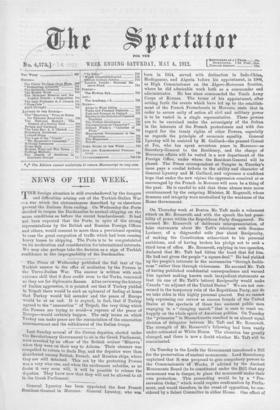On Thursday week at Boston Mr. Taft made a vehement
attack on Mr. Roosevelt, and with the speech the last possi- bility of peace within the Republican Party disappeared. He accused Mr. Roosevelt of deliberate misrepresentation, of false statements about Mr. Taft's relations with Senator Lorimer, of a disgraceful volge face about Reciprocity, of making the Constitution subservient to his personal ambitions, and of having broken his pledge not to seek a third term of office. Mr. Roosevelt, replying in two speeches, declared that Mr. Taft had bitten the band that fed him. He had not given the people " a square deal." He had yielded up the people's interests to the mercenaries "through feeble- ness " rather than through viciousness, He accused Mr. Taft of having published confidential correspondence and warned him against making known such inexpedient statements as that (in one of Mr. Taft's letters) Reciprocity would make Canada "an adjunct of the United States." We are not con- cerned in the temporary ruin of the Republican Party, nor do we take sides in this highly personal quarrel. But we cannot help expressing our sorrow as sincere friends of the United States at the spectacle of these two eminent public men engaging in a " slanging match" that is sure to react un- happily on the whole spirit of American politics. On Tuesday the "primaries" in Massachusetts resulted in an almost equal division of delegates between Mr. Taft and Mr. Roosevelt. The strength of Mr. Roosevelt's following had been vastly under-estimated at White House. The situation has greatly changed, and there is now a doubt whether Mr. Taft will be renominated.














































